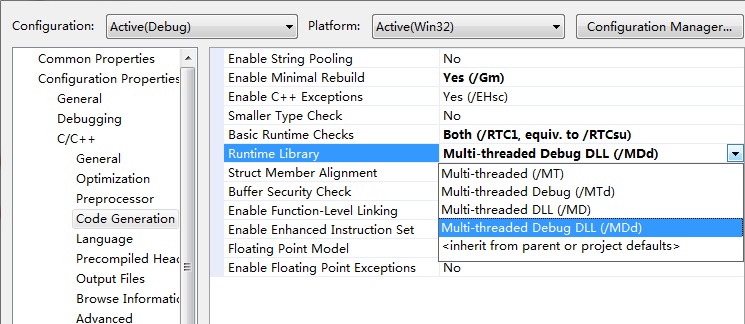前阵子翻了翻候杰老师翻译的那本Win32多线程的书,老书了,很经典。
书里提到,当使用C/C++的时候,有些情况下CreateThread会导致内存泄露,建议使用_beginthread和_beginthreadex。这种泄露网上也有不少帖子在讲。
事实上,这种泄露的可能是存在的,但是只要稍微注意一下,是可以找到方法避免的。
CreateThread导致内存泄露的原因
这得从C运行时库说起了。
VC运行时库,有一个宏errno,用来获得上一步操作的错误码,类似于Win32中的GetLastError()函数。在多线程环境下,不同线程调用errno返回的都是caller线程的错误码,绝对不会混淆,这是因为使用了TLS技术。
TLS,Thread Local Storage,是用来存取线程相关数据的一种技术,在Win32中由操作系统的Tls*系列函数提供支持。例如,可以在程序开始的地方调用TlsAlloc()函数,获得一个TLS index,这个index在进程范围内有效,然后可以创建n个线程,在每个线程中使用TlsSetValue(index,data)将线程相关数据和index关联起来,使用TlsGetValue(index)来获取当前线程和index相关联的的线程相关数据。
查看msdn可以发现,Tls*函数的定义如下:
- DWORD WINAPI TlsAlloc(void);
- BOOL WINAPI TlsSetValue(
- __in DWORD dwTlsIndex,
- __in LPVOID lpTlsValue
- );
- LPVOID WINAPI TlsGetValue(
- __in DWORD dwTlsIndex
- );
- BOOL WINAPI TlsFree(
- __in DWORD dwTlsIndex
- );
观察TlsSetValue/TlsGetValue的原型可以发现,与index关联的数据只能是void *类型,因此通常的做法是在线程开始的时候,为这个线程分配一块内存,用于存储所有与线程相关的数据,然后把这块内存的起始地址与index关联起来。如果这块内存在线程退出的时候没有释放掉,那就有内存泄露的危险。
回到errno,来看看C运行时库是如何实现errno的。
errno的声明和实现如下:
- /* error.h - errno的声明 */
- _CRTIMP extern int * __cdecl _errno(void);
- #define errno (*_errno())
- /* dosmap.c - errno的实现 */
- int * __cdecl _errno(
- void
- )
- {
- _ptiddata ptd = _getptd_noexit();
- if (!ptd) {
- return &ErrnoNoMem;
- } else {
- return ( &ptd->_terrno );
- }
- }
观察_errno的代码,函数首先调用了_getptd_noexit()函数,这个函数的代码如下:
- /* tiddata.c - _getptd_noexit()实现 */
- _ptiddata __cdecl _getptd_noexit (
- void
- )
- {
- _ptiddata ptd;
- DWORD TL_LastError;
- TL_LastError = GetLastError();
- #ifdef _M_IX86
- /*
- * Initialize FlsGetValue function pointer in TLS by calling __set_flsgetvalue()
- */
- if ( (ptd = (__set_flsgetvalue())(__flsindex)) == NULL ) {
- #else /* _M_IX86 */
- if ( (ptd = FLS_GETVALUE(__flsindex)) == NULL ) {
- #endif /* _M_IX86 */
- /*
- * no per-thread data structure for this thread. try to create
- * one.
- */
- #ifdef _DEBUG
- extern void * __cdecl _calloc_dbg_impl(size_t, size_t, int, const char *, int, int *);
- if ((ptd = _calloc_dbg_impl(1, sizeof(struct _tiddata), _CRT_BLOCK, __FILE__, __LINE__, NULL)) != NULL) {
- #else /* _DEBUG */
- if ((ptd = _calloc_crt(1, sizeof(struct _tiddata))) != NULL) {
- #endif /* _DEBUG */
- if (FLS_SETVALUE(__flsindex, (LPVOID)ptd) ) {
- /*
- * Initialize of per-thread data
- */
- _initptd(ptd,NULL);
- ptd->_tid = GetCurrentThreadId();
- ptd->_thandle = (uintptr_t)(-1);
- }
- else {
- /*
- * Return NULL to indicate failure
- */
- _free_crt(ptd);
- ptd = NULL;
- }
- }
- }
- SetLastError(TL_LastError);
- return(ptd);
- }
_getptd_noexit()函数首先通过TLS查找线程相关数据,如果没有找到,就分配一块内存,存放_tiddata结构,并将这块内存与__flsindex相关联。由此可见,errno的确使用了TLS技术,而且通过查找_getptd_noexit() 可以发现,VC运行时库中很多很多函数都使用了TLS,errno只不过是其中的一个典型。
可以猜测一下,当使用CreateThread函数创建线程后,线程函数并不会做C运行时库的初始化,而当线程函数调用errno或localtime或其他需要TLS支持的函数时,这些函数会调用_getptd_noexit()函数初始化一个VC运行时库的TLS数据,当线程函数退出时,这块内存不会自动释放,因此产生了泄漏。
接下来看一下_beginthread/_beginthreadex函数,看看这两个函数如何处理TLS数据:
- _MCRTIMP uintptr_t __cdecl _beginthread (
- void (__CLRCALL_OR_CDECL * initialcode) (void *),
- unsigned stacksize,
- void * argument
- )
- {
- _ptiddata ptd;
- ...
- __set_flsgetvalue();
- if ( (ptd = (_ptiddata)_calloc_crt(1, sizeof(struct _tiddata))) == NULL )
- {
- ...
- }
- ...
- ptd->_initaddr = (void *) initialcode;
- ptd->_initarg = argument;
- ...
- if ( (ptd->_thandle = thdl = (uintptr_t)
- CreateThread( NULL,
- stacksize,
- _threadstart,
- (LPVOID)ptd,
- CREATE_SUSPENDED,
- (LPDWORD)&(ptd->_tid) ))
- == (uintptr_t)0 )
- {
- ...
- }
- if ( ResumeThread( (HANDLE)thdl ) == (DWORD)(-1) ) {
- ...
- }
- ...
- }
- static unsigned long WINAPI _threadstart (
- void * ptd
- )
- {
- _ptiddata _ptd;
- ...
- if ( (_ptd = (_ptiddata)__fls_getvalue(__get_flsindex())) == NULL)
- {
- if ( !__fls_setvalue(__get_flsindex(), ptd) )
- {
- ExitThread(GetLastError());
- }
- }
- else
- {
- ..
- }
- ...
- _callthreadstart();
- return(0L);
- }
- static void _callthreadstart(void)
- {
- _ptiddata ptd;
- ptd = _getptd();
- __try
- {
- ( (void(__CLRCALL_OR_CDECL *)(void *))(((_ptiddata)ptd)->_initaddr) )
- ( ((_ptiddata)ptd)->_initarg );
- _endthread();
- }
- __except ( ... )
- {
- ...
- }
- }
- void __cdecl _endthread (
- void
- )
- {
- _ptiddata ptd;
- ptd = _getptd_noexit();
- if (ptd) {
- if ( ptd->_thandle != (uintptr_t)(-1) )
- (void) CloseHandle( (HANDLE)(ptd->_thandle) );
- _freeptd(ptd);
- }
- ExitThread(0);
- }
以_beginthread函数为例,如上所示的精简后的代码,整个流程如下:
1. 分配一块内存ptd用于存储_tiddata,并将之初始化,用户所指定的线程函数和参数被存放于ptd中
2. 创建线程,线程的启动函数为_threadstart函数,参数为ptd
3. _threadstart函数在将ptd设置为TLS数据后,调用_callthreadstart()函数
4. _callthreadstart()函数调用用户指定的线程函数,并传入用户指定的参数,然后调用_endthread()函数
5. _endthread()中,调用_freeptd(ptd),释放步骤1中分配的ptd
由此可见:
1. 使用_beginthread(ex)的理由在于这个函数对CRT的TLS数据进行了适当的分配和释放操作,避免内存泄露
2. 内存泄露存在的原因,是由CreateThead创建的线程不会去检查CRT的TLS数据是否需要释放
适当的处理
在了解了CreateThread导致内存泄露的原因后,我简单考虑了一下避免这种内存泄露的方法。
首先老老实实的使用_beginthead(ex)函数,是最稳妥的办法。
其次能否避免使用CRT中依赖TLS的函数呢?
也许可以,但是我们所书写的代码,不完全是我们自己在用,而且我们CreateThead所创建的线程,也不一定跑的都是自己的代码,例如我们提供一个库给别人使用,难道还要特别说明不允许使用errno/localtime等函数么?因此这个方法是不建议的。
如果我想用CreateProcess,或者我所使用的底层库使用的是CreateProcess函数,我又不可避免的会使用依赖于TLS的VC运行时库函数,有什么办法能保证ptd会被释放呢?
我们可以自己释放ptd。前面的分析可以看出,_endthread()函数调用了_freeptd(ptd)来释放ptd,因此我们可以在线程函数的末尾显示的调用_endthread()或_endthreadex(retcode)函数来释放ptd。在查看了_freeptd函数的代码后,我发现如果传入参数是NULL,_freeptd函数释放的就是caller线程的ptd,因此也可以直接调用_freeptd来执行清理。
另外,我们也可以自动释放ptd。在VC的工程属性中,可以选择运行时库的类型,如图:

如果我们选择/MTd或/MDd,运行时库以动态方式链接,即我们的程序会使用传说中的msvcrt*.dll。在这个dll的入口函数中,会在DLL_THREAD_ATTACH时为attach的线程初始化TLS数据,在DLL_THREAD_DETACH时为detach的线程调用_freeptd函数执行清理。因此如果我们使用VC的动态库,使用CreateThread和使用_beginthread是同样安全的。
总结一下,避免CreateThread引发泄露,大致有几种方法:
1. 使用_beginthread/_beginthreadex函数创建线程
2. 在线程函数return前,显示调用_endthread/_endthreadex函数
3. 在线程函数return前,显示调用_freeptd(NULL),此方法在C语言中有效
4. 使用/MTd或/MDd参数
补充
如果没有特殊的理由,一定不要使用TerminateThread函数来终止线程。在连接静态库的情况下,TerminateThread会使线程直接被终止,因此没有释放ptd的机会;在连接静态库的情况下,DLL_THREAD_DETACH只有在线程正常退出时才会产生,因此被终止的线程的ptd同样不会被释放。
引用的代码请参考VC crt的源代码。
由于分析得比较粗略,难免有错误,欢迎指正。